EU Regulation on Auditor Rotation: Rationale, Implications Analysis
VerifiedAdded on 2019/12/28
|9
|2609
|287
Report
AI Summary
This report critically analyzes the European Union's regulations on auditor rotation, exploring the rationale behind the policy, which aims to enhance auditor independence, objectivity, and professional skepticism, thereby improving the quality of financial reporting and strengthening investor confidence. The report evaluates the effectiveness of mandatory auditor rotation in achieving these goals, examining whether it truly leads to independence in appearance and reality. It assesses the potential implications of audit firm rotation, including its impact on audit quality, the costs incurred by companies, and the disruption to established relationships. The analysis considers arguments both for and against the regulation, referencing relevant literature to provide a comprehensive overview of the complexities and potential consequences of the EU's approach to auditor rotation.
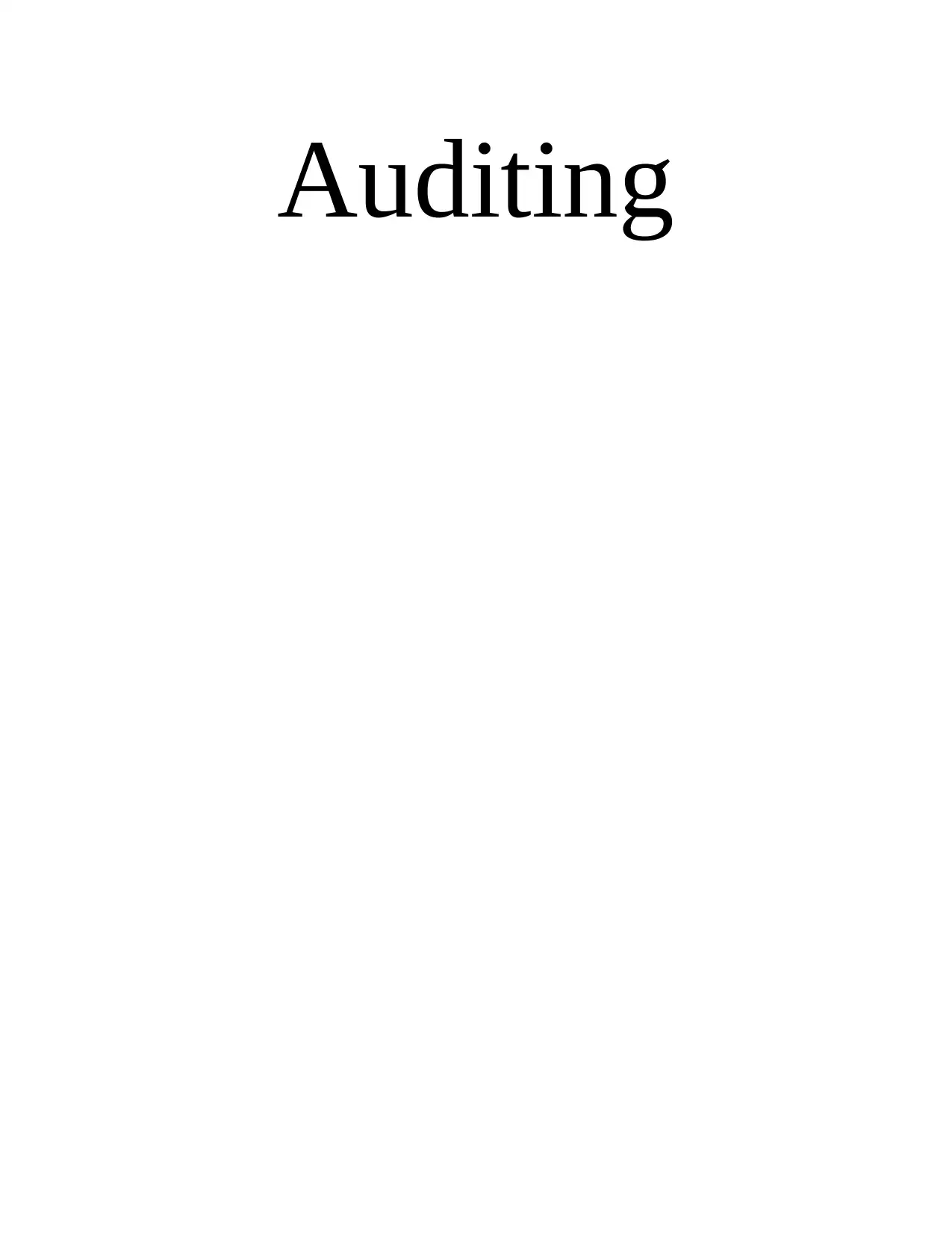
Auditing
Paraphrase This Document
Need a fresh take? Get an instant paraphrase of this document with our AI Paraphraser
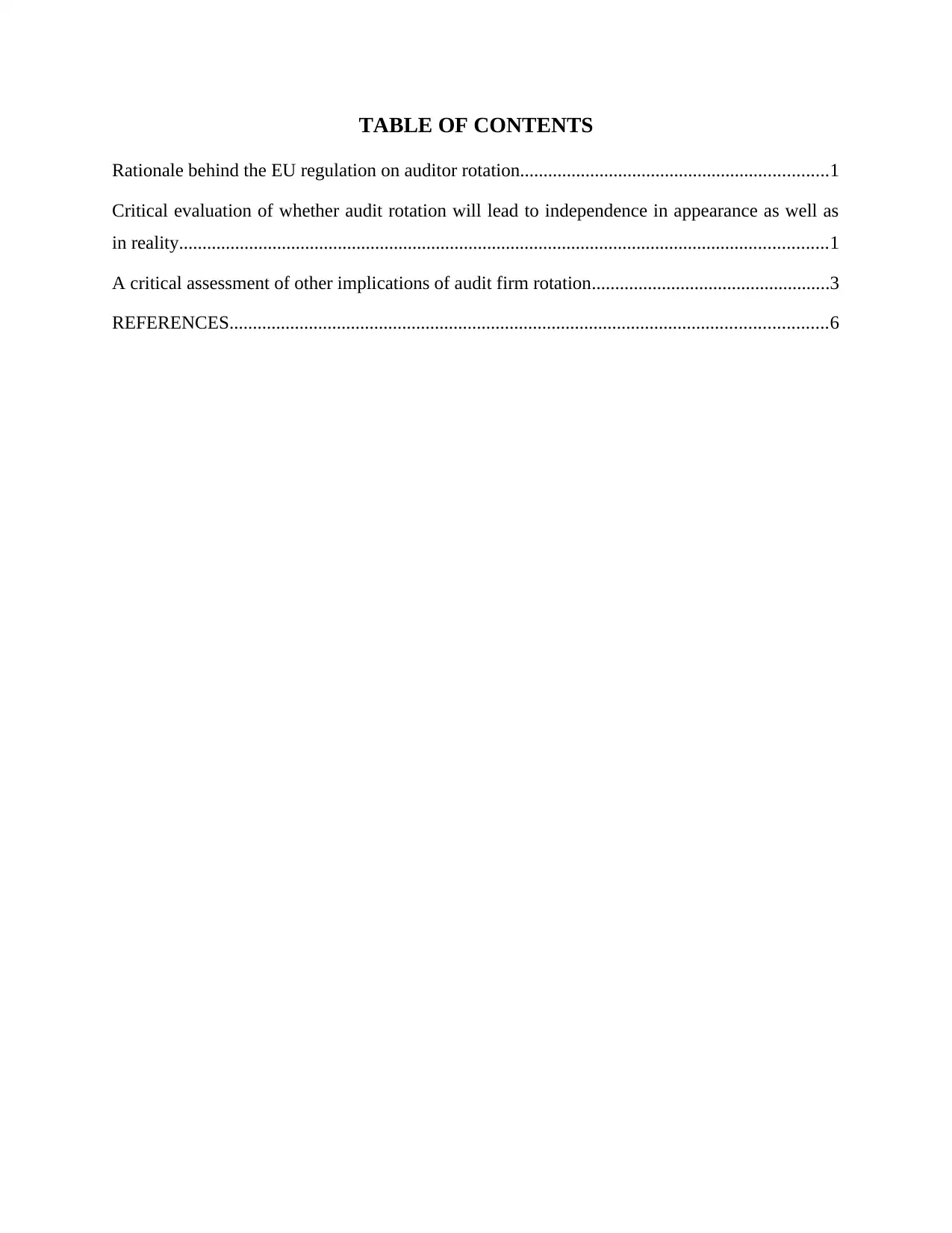
TABLE OF CONTENTS
Rationale behind the EU regulation on auditor rotation..................................................................1
Critical evaluation of whether audit rotation will lead to independence in appearance as well as
in reality...........................................................................................................................................1
A critical assessment of other implications of audit firm rotation...................................................3
REFERENCES................................................................................................................................6
Rationale behind the EU regulation on auditor rotation..................................................................1
Critical evaluation of whether audit rotation will lead to independence in appearance as well as
in reality...........................................................................................................................................1
A critical assessment of other implications of audit firm rotation...................................................3
REFERENCES................................................................................................................................6
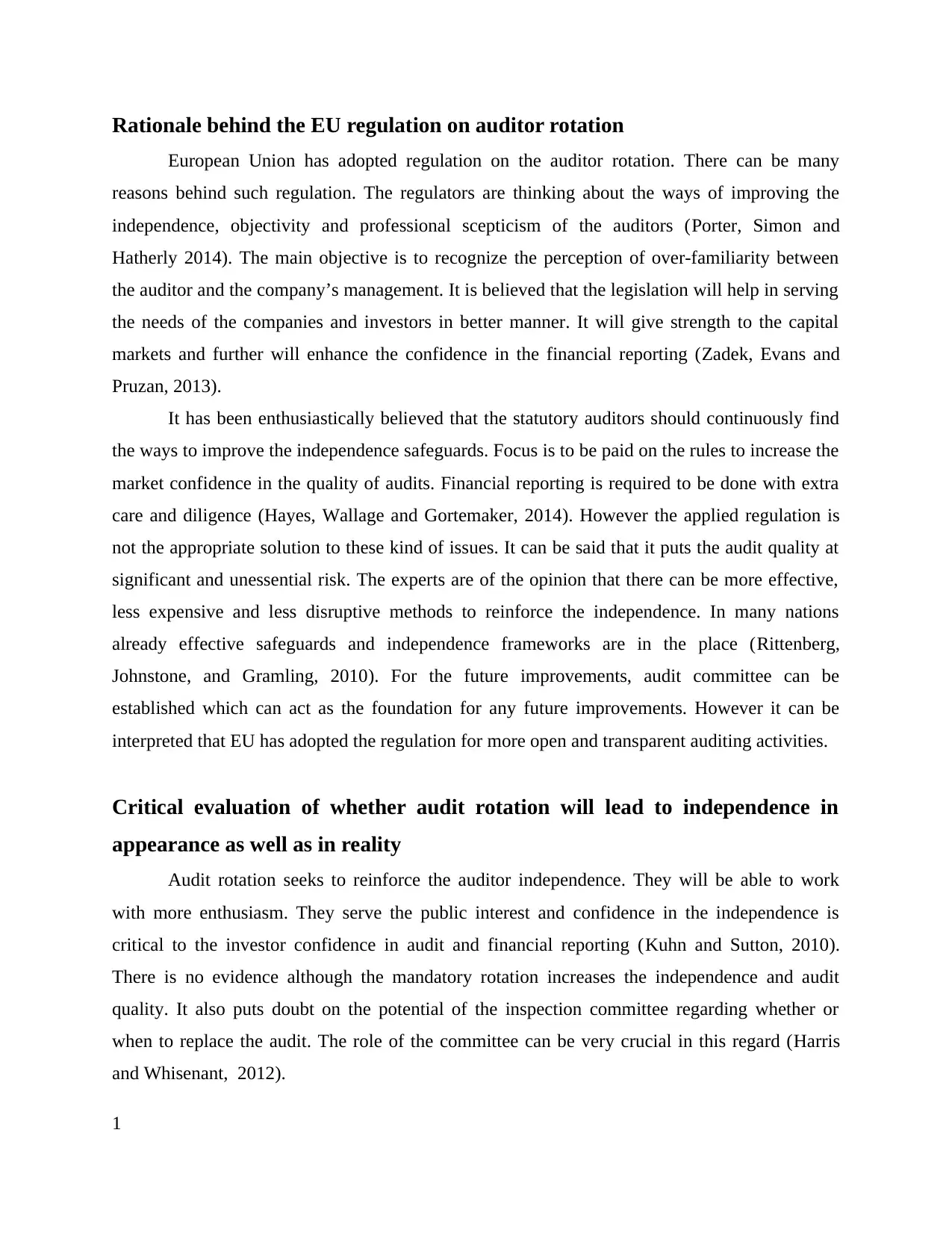
Rationale behind the EU regulation on auditor rotation
European Union has adopted regulation on the auditor rotation. There can be many
reasons behind such regulation. The regulators are thinking about the ways of improving the
independence, objectivity and professional scepticism of the auditors (Porter, Simon and
Hatherly 2014). The main objective is to recognize the perception of over-familiarity between
the auditor and the company’s management. It is believed that the legislation will help in serving
the needs of the companies and investors in better manner. It will give strength to the capital
markets and further will enhance the confidence in the financial reporting (Zadek, Evans and
Pruzan, 2013).
It has been enthusiastically believed that the statutory auditors should continuously find
the ways to improve the independence safeguards. Focus is to be paid on the rules to increase the
market confidence in the quality of audits. Financial reporting is required to be done with extra
care and diligence (Hayes, Wallage and Gortemaker, 2014). However the applied regulation is
not the appropriate solution to these kind of issues. It can be said that it puts the audit quality at
significant and unessential risk. The experts are of the opinion that there can be more effective,
less expensive and less disruptive methods to reinforce the independence. In many nations
already effective safeguards and independence frameworks are in the place (Rittenberg,
Johnstone, and Gramling, 2010). For the future improvements, audit committee can be
established which can act as the foundation for any future improvements. However it can be
interpreted that EU has adopted the regulation for more open and transparent auditing activities.
Critical evaluation of whether audit rotation will lead to independence in
appearance as well as in reality
Audit rotation seeks to reinforce the auditor independence. They will be able to work
with more enthusiasm. They serve the public interest and confidence in the independence is
critical to the investor confidence in audit and financial reporting (Kuhn and Sutton, 2010).
There is no evidence although the mandatory rotation increases the independence and audit
quality. It also puts doubt on the potential of the inspection committee regarding whether or
when to replace the audit. The role of the committee can be very crucial in this regard (Harris
and Whisenant, 2012).
1
European Union has adopted regulation on the auditor rotation. There can be many
reasons behind such regulation. The regulators are thinking about the ways of improving the
independence, objectivity and professional scepticism of the auditors (Porter, Simon and
Hatherly 2014). The main objective is to recognize the perception of over-familiarity between
the auditor and the company’s management. It is believed that the legislation will help in serving
the needs of the companies and investors in better manner. It will give strength to the capital
markets and further will enhance the confidence in the financial reporting (Zadek, Evans and
Pruzan, 2013).
It has been enthusiastically believed that the statutory auditors should continuously find
the ways to improve the independence safeguards. Focus is to be paid on the rules to increase the
market confidence in the quality of audits. Financial reporting is required to be done with extra
care and diligence (Hayes, Wallage and Gortemaker, 2014). However the applied regulation is
not the appropriate solution to these kind of issues. It can be said that it puts the audit quality at
significant and unessential risk. The experts are of the opinion that there can be more effective,
less expensive and less disruptive methods to reinforce the independence. In many nations
already effective safeguards and independence frameworks are in the place (Rittenberg,
Johnstone, and Gramling, 2010). For the future improvements, audit committee can be
established which can act as the foundation for any future improvements. However it can be
interpreted that EU has adopted the regulation for more open and transparent auditing activities.
Critical evaluation of whether audit rotation will lead to independence in
appearance as well as in reality
Audit rotation seeks to reinforce the auditor independence. They will be able to work
with more enthusiasm. They serve the public interest and confidence in the independence is
critical to the investor confidence in audit and financial reporting (Kuhn and Sutton, 2010).
There is no evidence although the mandatory rotation increases the independence and audit
quality. It also puts doubt on the potential of the inspection committee regarding whether or
when to replace the audit. The role of the committee can be very crucial in this regard (Harris
and Whisenant, 2012).
1
⊘ This is a preview!⊘
Do you want full access?
Subscribe today to unlock all pages.

Trusted by 1+ million students worldwide
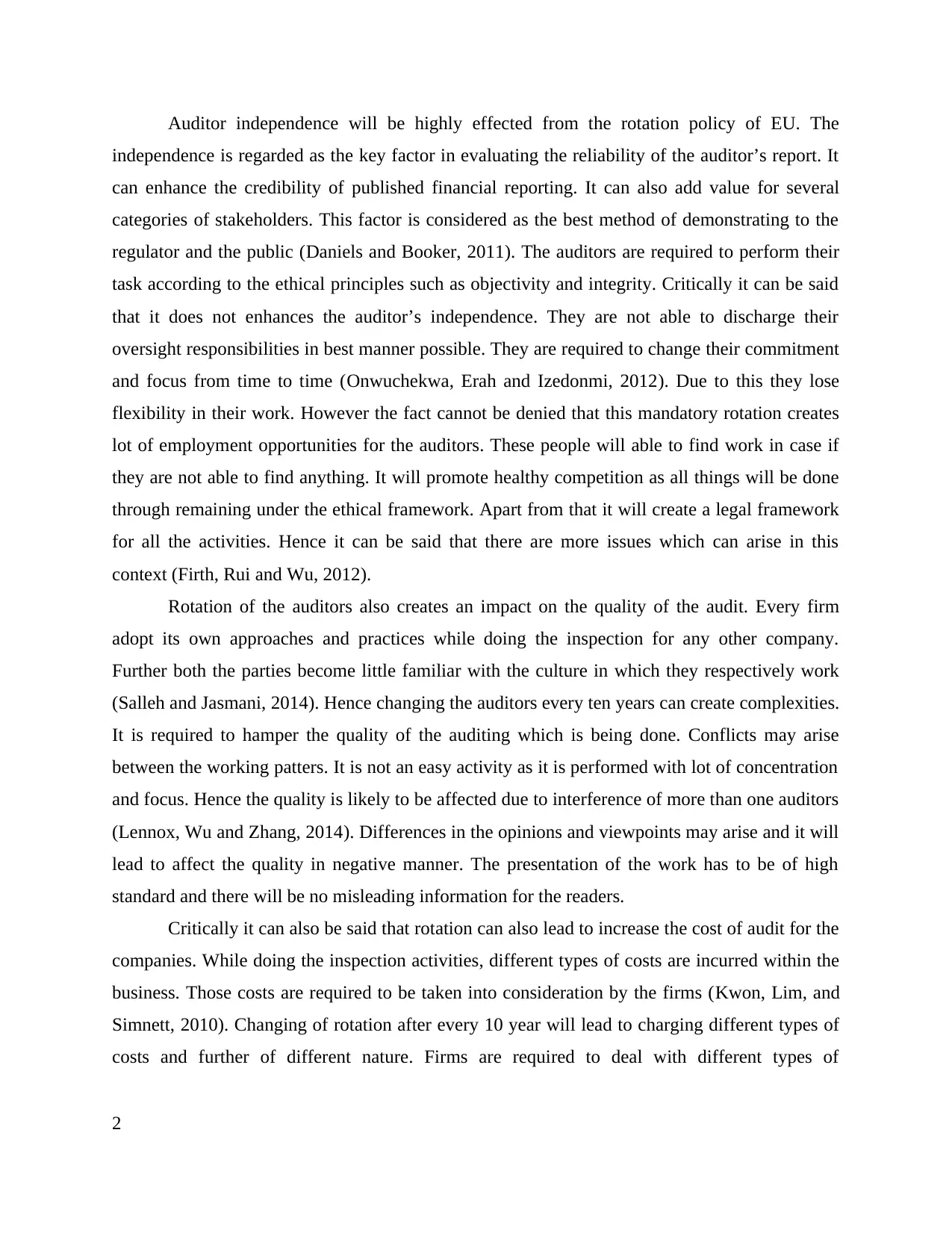
Auditor independence will be highly effected from the rotation policy of EU. The
independence is regarded as the key factor in evaluating the reliability of the auditor’s report. It
can enhance the credibility of published financial reporting. It can also add value for several
categories of stakeholders. This factor is considered as the best method of demonstrating to the
regulator and the public (Daniels and Booker, 2011). The auditors are required to perform their
task according to the ethical principles such as objectivity and integrity. Critically it can be said
that it does not enhances the auditor’s independence. They are not able to discharge their
oversight responsibilities in best manner possible. They are required to change their commitment
and focus from time to time (Onwuchekwa, Erah and Izedonmi, 2012). Due to this they lose
flexibility in their work. However the fact cannot be denied that this mandatory rotation creates
lot of employment opportunities for the auditors. These people will able to find work in case if
they are not able to find anything. It will promote healthy competition as all things will be done
through remaining under the ethical framework. Apart from that it will create a legal framework
for all the activities. Hence it can be said that there are more issues which can arise in this
context (Firth, Rui and Wu, 2012).
Rotation of the auditors also creates an impact on the quality of the audit. Every firm
adopt its own approaches and practices while doing the inspection for any other company.
Further both the parties become little familiar with the culture in which they respectively work
(Salleh and Jasmani, 2014). Hence changing the auditors every ten years can create complexities.
It is required to hamper the quality of the auditing which is being done. Conflicts may arise
between the working patters. It is not an easy activity as it is performed with lot of concentration
and focus. Hence the quality is likely to be affected due to interference of more than one auditors
(Lennox, Wu and Zhang, 2014). Differences in the opinions and viewpoints may arise and it will
lead to affect the quality in negative manner. The presentation of the work has to be of high
standard and there will be no misleading information for the readers.
Critically it can also be said that rotation can also lead to increase the cost of audit for the
companies. While doing the inspection activities, different types of costs are incurred within the
business. Those costs are required to be taken into consideration by the firms (Kwon, Lim, and
Simnett, 2010). Changing of rotation after every 10 year will lead to charging different types of
costs and further of different nature. Firms are required to deal with different types of
2
independence is regarded as the key factor in evaluating the reliability of the auditor’s report. It
can enhance the credibility of published financial reporting. It can also add value for several
categories of stakeholders. This factor is considered as the best method of demonstrating to the
regulator and the public (Daniels and Booker, 2011). The auditors are required to perform their
task according to the ethical principles such as objectivity and integrity. Critically it can be said
that it does not enhances the auditor’s independence. They are not able to discharge their
oversight responsibilities in best manner possible. They are required to change their commitment
and focus from time to time (Onwuchekwa, Erah and Izedonmi, 2012). Due to this they lose
flexibility in their work. However the fact cannot be denied that this mandatory rotation creates
lot of employment opportunities for the auditors. These people will able to find work in case if
they are not able to find anything. It will promote healthy competition as all things will be done
through remaining under the ethical framework. Apart from that it will create a legal framework
for all the activities. Hence it can be said that there are more issues which can arise in this
context (Firth, Rui and Wu, 2012).
Rotation of the auditors also creates an impact on the quality of the audit. Every firm
adopt its own approaches and practices while doing the inspection for any other company.
Further both the parties become little familiar with the culture in which they respectively work
(Salleh and Jasmani, 2014). Hence changing the auditors every ten years can create complexities.
It is required to hamper the quality of the auditing which is being done. Conflicts may arise
between the working patters. It is not an easy activity as it is performed with lot of concentration
and focus. Hence the quality is likely to be affected due to interference of more than one auditors
(Lennox, Wu and Zhang, 2014). Differences in the opinions and viewpoints may arise and it will
lead to affect the quality in negative manner. The presentation of the work has to be of high
standard and there will be no misleading information for the readers.
Critically it can also be said that rotation can also lead to increase the cost of audit for the
companies. While doing the inspection activities, different types of costs are incurred within the
business. Those costs are required to be taken into consideration by the firms (Kwon, Lim, and
Simnett, 2010). Changing of rotation after every 10 year will lead to charging different types of
costs and further of different nature. Firms are required to deal with different types of
2
Paraphrase This Document
Need a fresh take? Get an instant paraphrase of this document with our AI Paraphraser
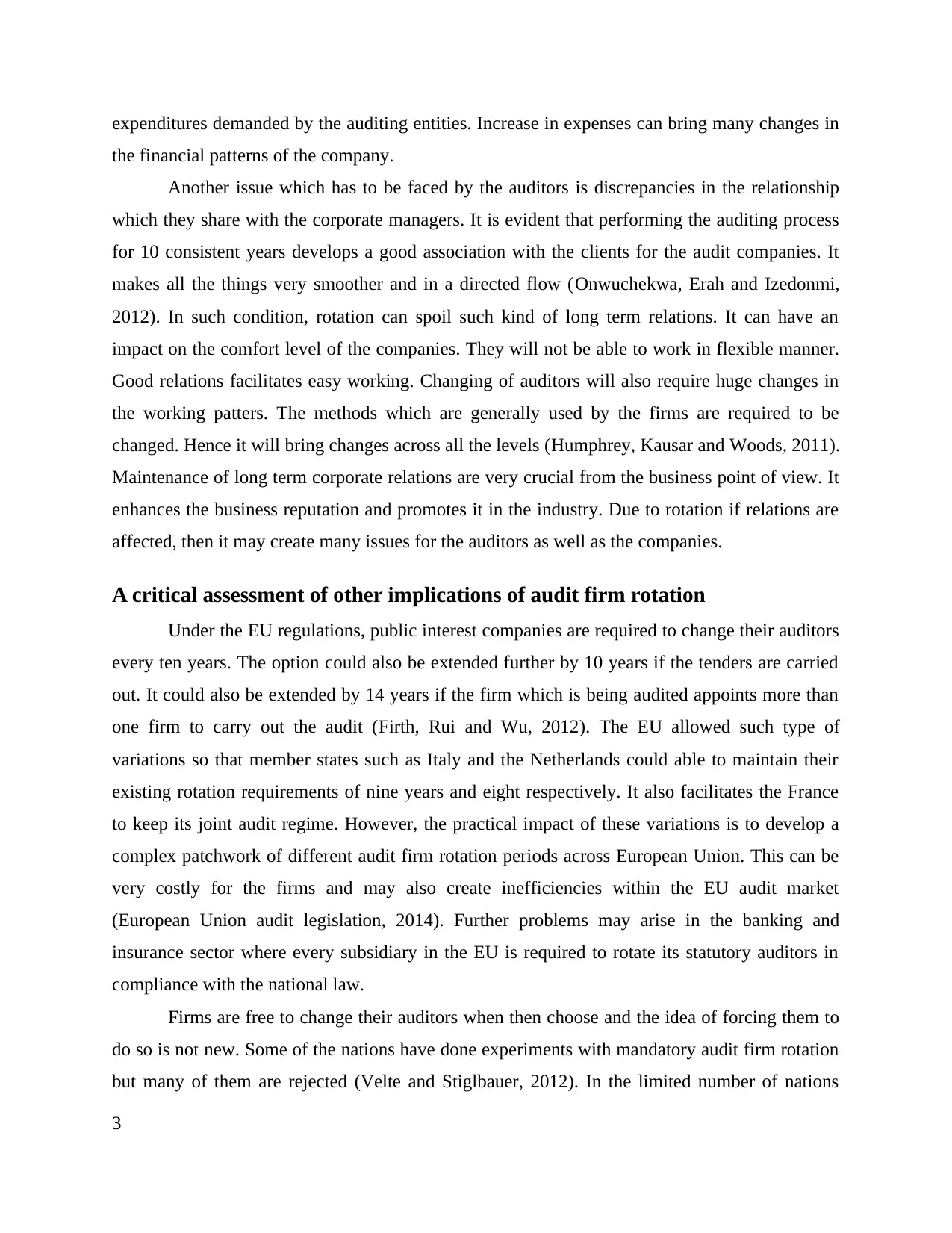
expenditures demanded by the auditing entities. Increase in expenses can bring many changes in
the financial patterns of the company.
Another issue which has to be faced by the auditors is discrepancies in the relationship
which they share with the corporate managers. It is evident that performing the auditing process
for 10 consistent years develops a good association with the clients for the audit companies. It
makes all the things very smoother and in a directed flow (Onwuchekwa, Erah and Izedonmi,
2012). In such condition, rotation can spoil such kind of long term relations. It can have an
impact on the comfort level of the companies. They will not be able to work in flexible manner.
Good relations facilitates easy working. Changing of auditors will also require huge changes in
the working patters. The methods which are generally used by the firms are required to be
changed. Hence it will bring changes across all the levels (Humphrey, Kausar and Woods, 2011).
Maintenance of long term corporate relations are very crucial from the business point of view. It
enhances the business reputation and promotes it in the industry. Due to rotation if relations are
affected, then it may create many issues for the auditors as well as the companies.
A critical assessment of other implications of audit firm rotation
Under the EU regulations, public interest companies are required to change their auditors
every ten years. The option could also be extended further by 10 years if the tenders are carried
out. It could also be extended by 14 years if the firm which is being audited appoints more than
one firm to carry out the audit (Firth, Rui and Wu, 2012). The EU allowed such type of
variations so that member states such as Italy and the Netherlands could able to maintain their
existing rotation requirements of nine years and eight respectively. It also facilitates the France
to keep its joint audit regime. However, the practical impact of these variations is to develop a
complex patchwork of different audit firm rotation periods across European Union. This can be
very costly for the firms and may also create inefficiencies within the EU audit market
(European Union audit legislation, 2014). Further problems may arise in the banking and
insurance sector where every subsidiary in the EU is required to rotate its statutory auditors in
compliance with the national law.
Firms are free to change their auditors when then choose and the idea of forcing them to
do so is not new. Some of the nations have done experiments with mandatory audit firm rotation
but many of them are rejected (Velte and Stiglbauer, 2012). In the limited number of nations
3
the financial patterns of the company.
Another issue which has to be faced by the auditors is discrepancies in the relationship
which they share with the corporate managers. It is evident that performing the auditing process
for 10 consistent years develops a good association with the clients for the audit companies. It
makes all the things very smoother and in a directed flow (Onwuchekwa, Erah and Izedonmi,
2012). In such condition, rotation can spoil such kind of long term relations. It can have an
impact on the comfort level of the companies. They will not be able to work in flexible manner.
Good relations facilitates easy working. Changing of auditors will also require huge changes in
the working patters. The methods which are generally used by the firms are required to be
changed. Hence it will bring changes across all the levels (Humphrey, Kausar and Woods, 2011).
Maintenance of long term corporate relations are very crucial from the business point of view. It
enhances the business reputation and promotes it in the industry. Due to rotation if relations are
affected, then it may create many issues for the auditors as well as the companies.
A critical assessment of other implications of audit firm rotation
Under the EU regulations, public interest companies are required to change their auditors
every ten years. The option could also be extended further by 10 years if the tenders are carried
out. It could also be extended by 14 years if the firm which is being audited appoints more than
one firm to carry out the audit (Firth, Rui and Wu, 2012). The EU allowed such type of
variations so that member states such as Italy and the Netherlands could able to maintain their
existing rotation requirements of nine years and eight respectively. It also facilitates the France
to keep its joint audit regime. However, the practical impact of these variations is to develop a
complex patchwork of different audit firm rotation periods across European Union. This can be
very costly for the firms and may also create inefficiencies within the EU audit market
(European Union audit legislation, 2014). Further problems may arise in the banking and
insurance sector where every subsidiary in the EU is required to rotate its statutory auditors in
compliance with the national law.
Firms are free to change their auditors when then choose and the idea of forcing them to
do so is not new. Some of the nations have done experiments with mandatory audit firm rotation
but many of them are rejected (Velte and Stiglbauer, 2012). In the limited number of nations
3
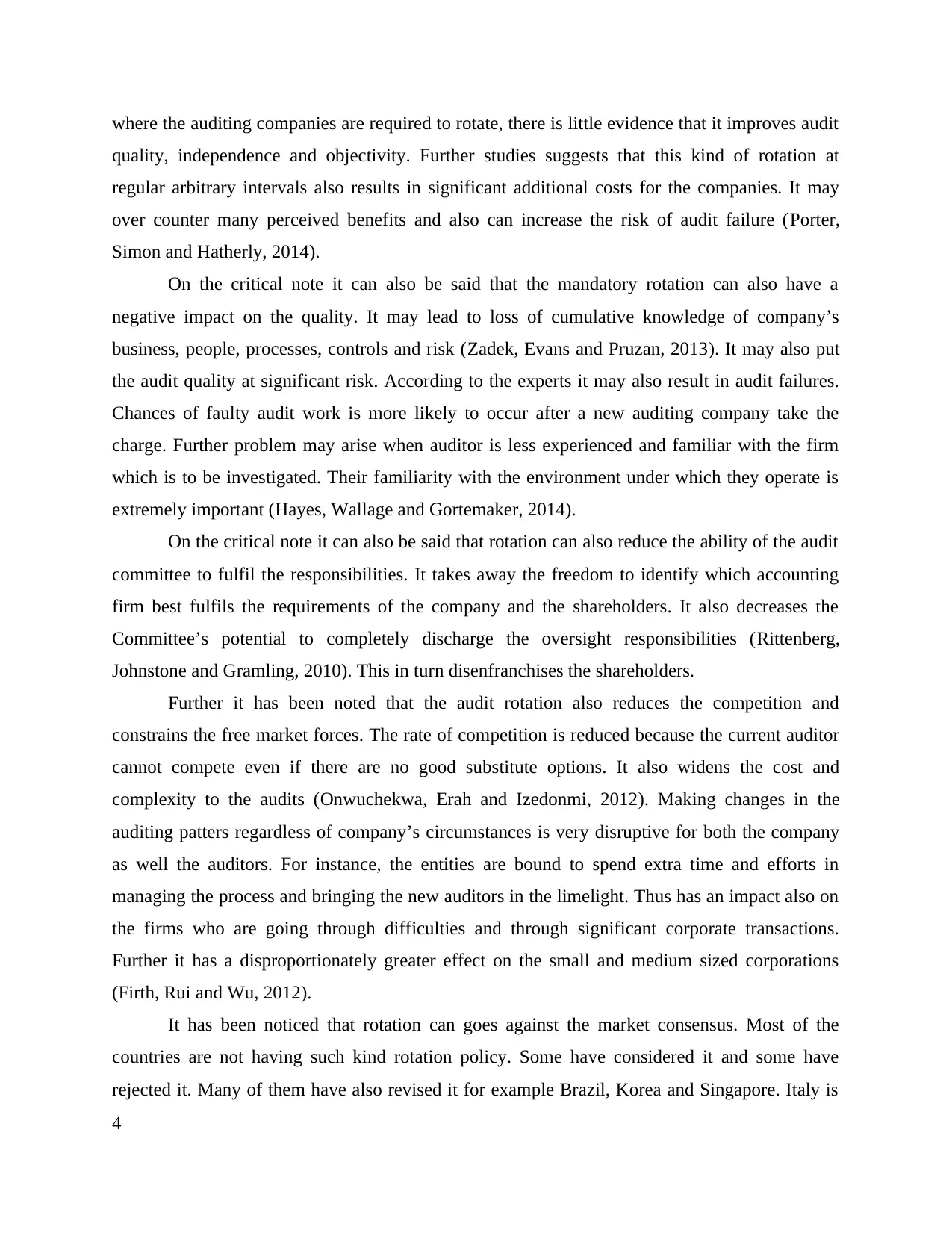
where the auditing companies are required to rotate, there is little evidence that it improves audit
quality, independence and objectivity. Further studies suggests that this kind of rotation at
regular arbitrary intervals also results in significant additional costs for the companies. It may
over counter many perceived benefits and also can increase the risk of audit failure (Porter,
Simon and Hatherly, 2014).
On the critical note it can also be said that the mandatory rotation can also have a
negative impact on the quality. It may lead to loss of cumulative knowledge of company’s
business, people, processes, controls and risk (Zadek, Evans and Pruzan, 2013). It may also put
the audit quality at significant risk. According to the experts it may also result in audit failures.
Chances of faulty audit work is more likely to occur after a new auditing company take the
charge. Further problem may arise when auditor is less experienced and familiar with the firm
which is to be investigated. Their familiarity with the environment under which they operate is
extremely important (Hayes, Wallage and Gortemaker, 2014).
On the critical note it can also be said that rotation can also reduce the ability of the audit
committee to fulfil the responsibilities. It takes away the freedom to identify which accounting
firm best fulfils the requirements of the company and the shareholders. It also decreases the
Committee’s potential to completely discharge the oversight responsibilities (Rittenberg,
Johnstone and Gramling, 2010). This in turn disenfranchises the shareholders.
Further it has been noted that the audit rotation also reduces the competition and
constrains the free market forces. The rate of competition is reduced because the current auditor
cannot compete even if there are no good substitute options. It also widens the cost and
complexity to the audits (Onwuchekwa, Erah and Izedonmi, 2012). Making changes in the
auditing patters regardless of company’s circumstances is very disruptive for both the company
as well the auditors. For instance, the entities are bound to spend extra time and efforts in
managing the process and bringing the new auditors in the limelight. Thus has an impact also on
the firms who are going through difficulties and through significant corporate transactions.
Further it has a disproportionately greater effect on the small and medium sized corporations
(Firth, Rui and Wu, 2012).
It has been noticed that rotation can goes against the market consensus. Most of the
countries are not having such kind rotation policy. Some have considered it and some have
rejected it. Many of them have also revised it for example Brazil, Korea and Singapore. Italy is
4
quality, independence and objectivity. Further studies suggests that this kind of rotation at
regular arbitrary intervals also results in significant additional costs for the companies. It may
over counter many perceived benefits and also can increase the risk of audit failure (Porter,
Simon and Hatherly, 2014).
On the critical note it can also be said that the mandatory rotation can also have a
negative impact on the quality. It may lead to loss of cumulative knowledge of company’s
business, people, processes, controls and risk (Zadek, Evans and Pruzan, 2013). It may also put
the audit quality at significant risk. According to the experts it may also result in audit failures.
Chances of faulty audit work is more likely to occur after a new auditing company take the
charge. Further problem may arise when auditor is less experienced and familiar with the firm
which is to be investigated. Their familiarity with the environment under which they operate is
extremely important (Hayes, Wallage and Gortemaker, 2014).
On the critical note it can also be said that rotation can also reduce the ability of the audit
committee to fulfil the responsibilities. It takes away the freedom to identify which accounting
firm best fulfils the requirements of the company and the shareholders. It also decreases the
Committee’s potential to completely discharge the oversight responsibilities (Rittenberg,
Johnstone and Gramling, 2010). This in turn disenfranchises the shareholders.
Further it has been noted that the audit rotation also reduces the competition and
constrains the free market forces. The rate of competition is reduced because the current auditor
cannot compete even if there are no good substitute options. It also widens the cost and
complexity to the audits (Onwuchekwa, Erah and Izedonmi, 2012). Making changes in the
auditing patters regardless of company’s circumstances is very disruptive for both the company
as well the auditors. For instance, the entities are bound to spend extra time and efforts in
managing the process and bringing the new auditors in the limelight. Thus has an impact also on
the firms who are going through difficulties and through significant corporate transactions.
Further it has a disproportionately greater effect on the small and medium sized corporations
(Firth, Rui and Wu, 2012).
It has been noticed that rotation can goes against the market consensus. Most of the
countries are not having such kind rotation policy. Some have considered it and some have
rejected it. Many of them have also revised it for example Brazil, Korea and Singapore. Italy is
4
⊘ This is a preview!⊘
Do you want full access?
Subscribe today to unlock all pages.

Trusted by 1+ million students worldwide
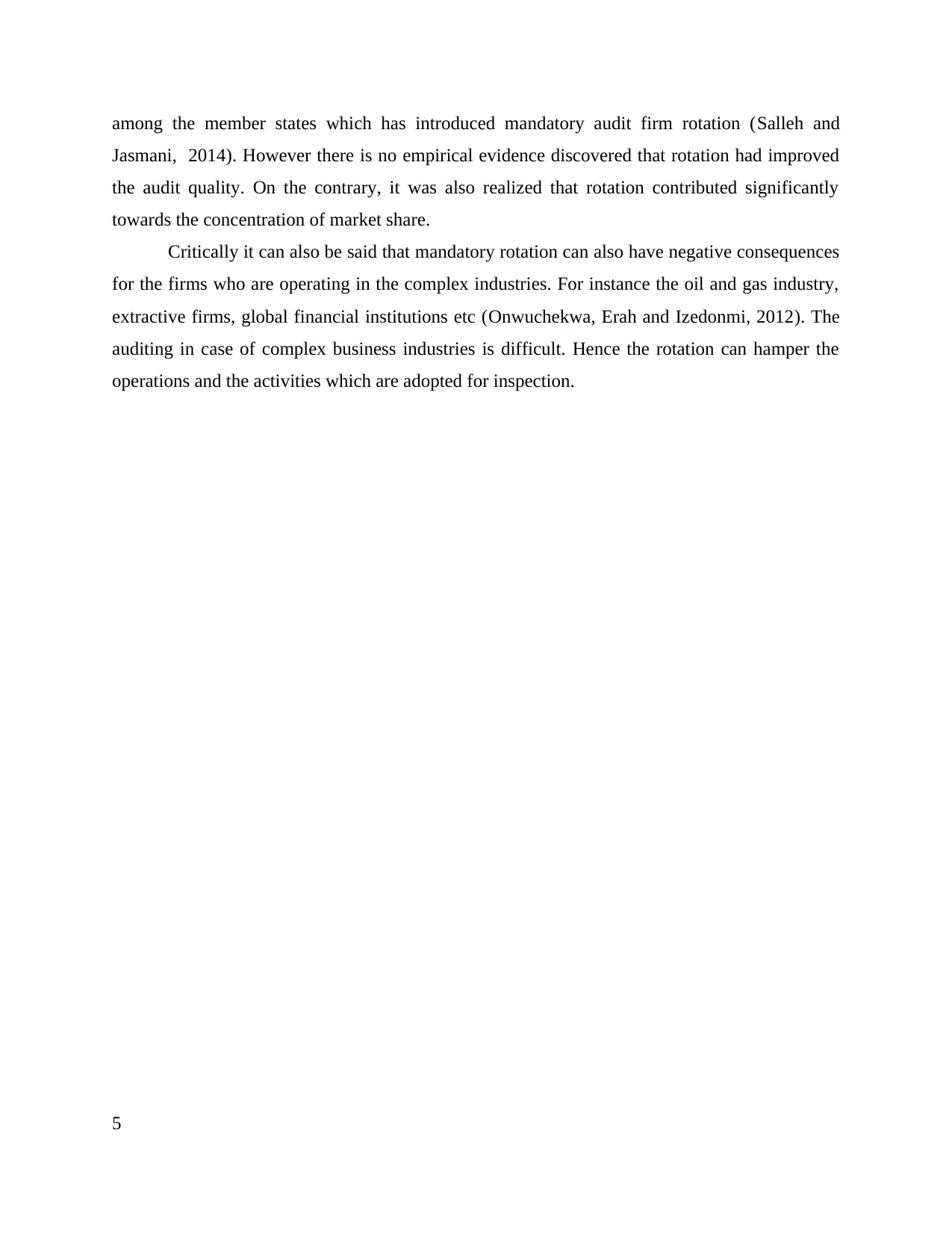
among the member states which has introduced mandatory audit firm rotation (Salleh and
Jasmani, 2014). However there is no empirical evidence discovered that rotation had improved
the audit quality. On the contrary, it was also realized that rotation contributed significantly
towards the concentration of market share.
Critically it can also be said that mandatory rotation can also have negative consequences
for the firms who are operating in the complex industries. For instance the oil and gas industry,
extractive firms, global financial institutions etc (Onwuchekwa, Erah and Izedonmi, 2012). The
auditing in case of complex business industries is difficult. Hence the rotation can hamper the
operations and the activities which are adopted for inspection.
5
Jasmani, 2014). However there is no empirical evidence discovered that rotation had improved
the audit quality. On the contrary, it was also realized that rotation contributed significantly
towards the concentration of market share.
Critically it can also be said that mandatory rotation can also have negative consequences
for the firms who are operating in the complex industries. For instance the oil and gas industry,
extractive firms, global financial institutions etc (Onwuchekwa, Erah and Izedonmi, 2012). The
auditing in case of complex business industries is difficult. Hence the rotation can hamper the
operations and the activities which are adopted for inspection.
5
Paraphrase This Document
Need a fresh take? Get an instant paraphrase of this document with our AI Paraphraser
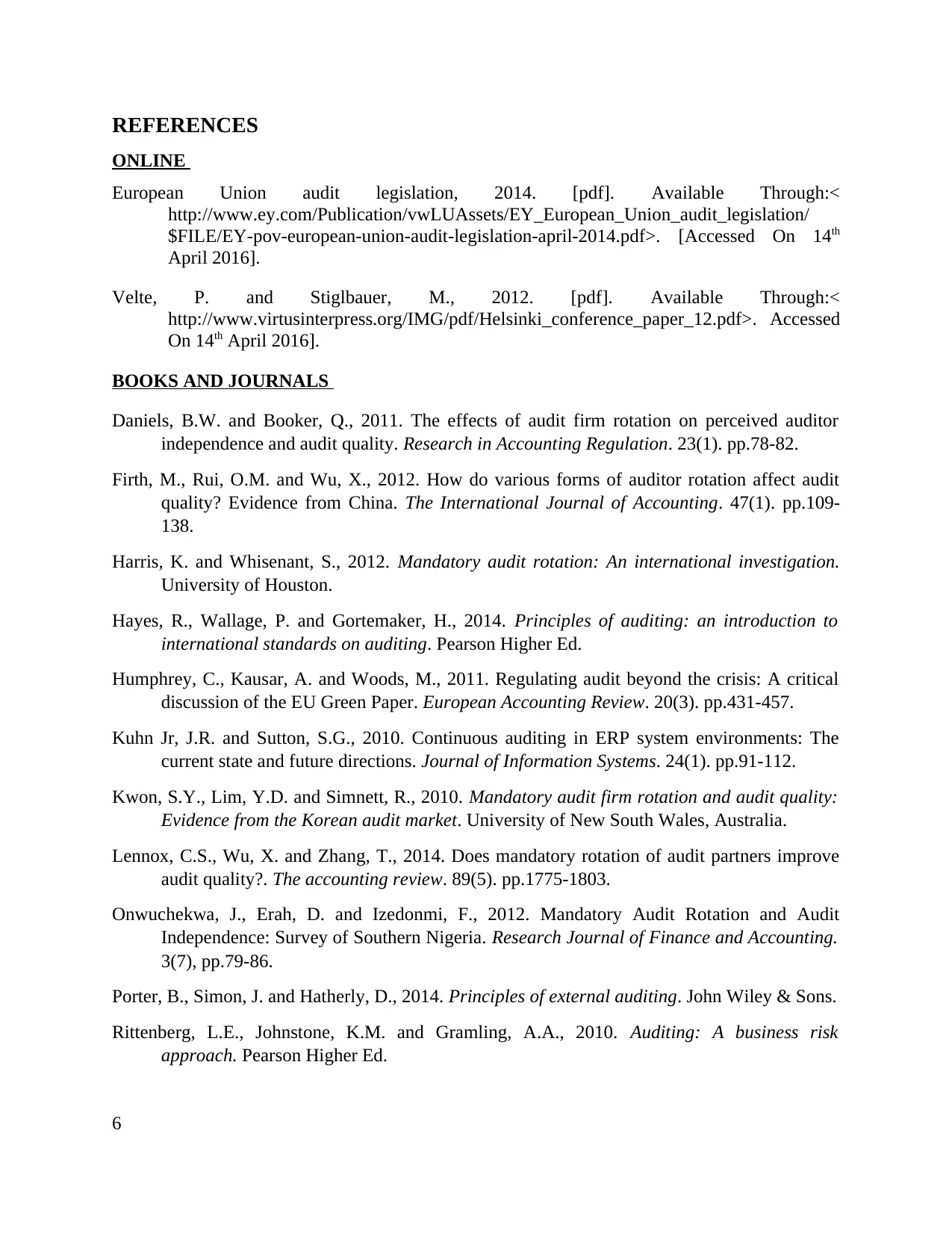
REFERENCES
ONLINE
European Union audit legislation, 2014. [pdf]. Available Through:<
http://www.ey.com/Publication/vwLUAssets/EY_European_Union_audit_legislation/
$FILE/EY-pov-european-union-audit-legislation-april-2014.pdf>. [Accessed On 14th
April 2016].
Velte, P. and Stiglbauer, M., 2012. [pdf]. Available Through:<
http://www.virtusinterpress.org/IMG/pdf/Helsinki_conference_paper_12.pdf>. Accessed
On 14th April 2016].
BOOKS AND JOURNALS
Daniels, B.W. and Booker, Q., 2011. The effects of audit firm rotation on perceived auditor
independence and audit quality. Research in Accounting Regulation. 23(1). pp.78-82.
Firth, M., Rui, O.M. and Wu, X., 2012. How do various forms of auditor rotation affect audit
quality? Evidence from China. The International Journal of Accounting. 47(1). pp.109-
138.
Harris, K. and Whisenant, S., 2012. Mandatory audit rotation: An international investigation.
University of Houston.
Hayes, R., Wallage, P. and Gortemaker, H., 2014. Principles of auditing: an introduction to
international standards on auditing. Pearson Higher Ed.
Humphrey, C., Kausar, A. and Woods, M., 2011. Regulating audit beyond the crisis: A critical
discussion of the EU Green Paper. European Accounting Review. 20(3). pp.431-457.
Kuhn Jr, J.R. and Sutton, S.G., 2010. Continuous auditing in ERP system environments: The
current state and future directions. Journal of Information Systems. 24(1). pp.91-112.
Kwon, S.Y., Lim, Y.D. and Simnett, R., 2010. Mandatory audit firm rotation and audit quality:
Evidence from the Korean audit market. University of New South Wales, Australia.
Lennox, C.S., Wu, X. and Zhang, T., 2014. Does mandatory rotation of audit partners improve
audit quality?. The accounting review. 89(5). pp.1775-1803.
Onwuchekwa, J., Erah, D. and Izedonmi, F., 2012. Mandatory Audit Rotation and Audit
Independence: Survey of Southern Nigeria. Research Journal of Finance and Accounting.
3(7), pp.79-86.
Porter, B., Simon, J. and Hatherly, D., 2014. Principles of external auditing. John Wiley & Sons.
Rittenberg, L.E., Johnstone, K.M. and Gramling, A.A., 2010. Auditing: A business risk
approach. Pearson Higher Ed.
6
ONLINE
European Union audit legislation, 2014. [pdf]. Available Through:<
http://www.ey.com/Publication/vwLUAssets/EY_European_Union_audit_legislation/
$FILE/EY-pov-european-union-audit-legislation-april-2014.pdf>. [Accessed On 14th
April 2016].
Velte, P. and Stiglbauer, M., 2012. [pdf]. Available Through:<
http://www.virtusinterpress.org/IMG/pdf/Helsinki_conference_paper_12.pdf>. Accessed
On 14th April 2016].
BOOKS AND JOURNALS
Daniels, B.W. and Booker, Q., 2011. The effects of audit firm rotation on perceived auditor
independence and audit quality. Research in Accounting Regulation. 23(1). pp.78-82.
Firth, M., Rui, O.M. and Wu, X., 2012. How do various forms of auditor rotation affect audit
quality? Evidence from China. The International Journal of Accounting. 47(1). pp.109-
138.
Harris, K. and Whisenant, S., 2012. Mandatory audit rotation: An international investigation.
University of Houston.
Hayes, R., Wallage, P. and Gortemaker, H., 2014. Principles of auditing: an introduction to
international standards on auditing. Pearson Higher Ed.
Humphrey, C., Kausar, A. and Woods, M., 2011. Regulating audit beyond the crisis: A critical
discussion of the EU Green Paper. European Accounting Review. 20(3). pp.431-457.
Kuhn Jr, J.R. and Sutton, S.G., 2010. Continuous auditing in ERP system environments: The
current state and future directions. Journal of Information Systems. 24(1). pp.91-112.
Kwon, S.Y., Lim, Y.D. and Simnett, R., 2010. Mandatory audit firm rotation and audit quality:
Evidence from the Korean audit market. University of New South Wales, Australia.
Lennox, C.S., Wu, X. and Zhang, T., 2014. Does mandatory rotation of audit partners improve
audit quality?. The accounting review. 89(5). pp.1775-1803.
Onwuchekwa, J., Erah, D. and Izedonmi, F., 2012. Mandatory Audit Rotation and Audit
Independence: Survey of Southern Nigeria. Research Journal of Finance and Accounting.
3(7), pp.79-86.
Porter, B., Simon, J. and Hatherly, D., 2014. Principles of external auditing. John Wiley & Sons.
Rittenberg, L.E., Johnstone, K.M. and Gramling, A.A., 2010. Auditing: A business risk
approach. Pearson Higher Ed.
6
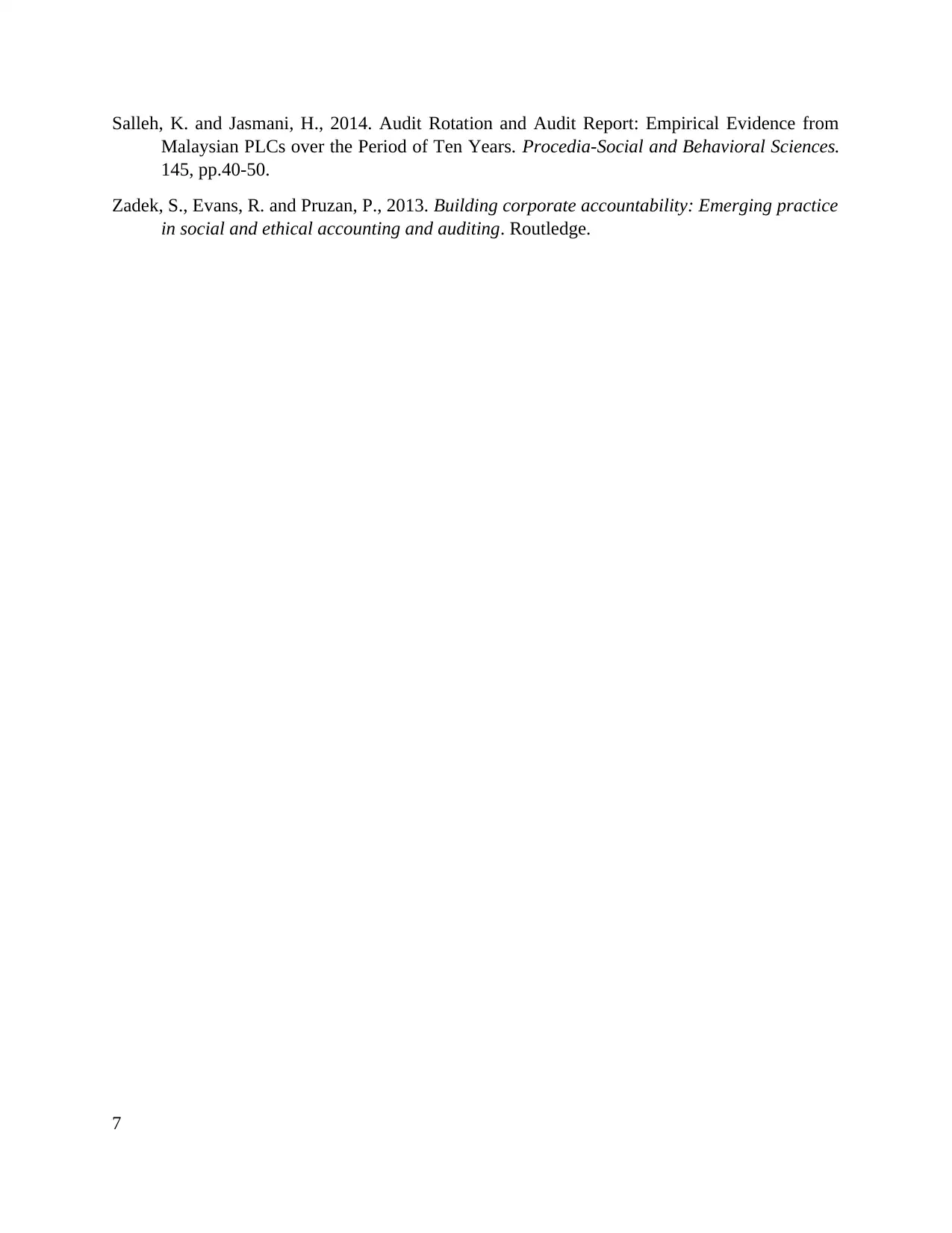
Salleh, K. and Jasmani, H., 2014. Audit Rotation and Audit Report: Empirical Evidence from
Malaysian PLCs over the Period of Ten Years. Procedia-Social and Behavioral Sciences.
145, pp.40-50.
Zadek, S., Evans, R. and Pruzan, P., 2013. Building corporate accountability: Emerging practice
in social and ethical accounting and auditing. Routledge.
7
Malaysian PLCs over the Period of Ten Years. Procedia-Social and Behavioral Sciences.
145, pp.40-50.
Zadek, S., Evans, R. and Pruzan, P., 2013. Building corporate accountability: Emerging practice
in social and ethical accounting and auditing. Routledge.
7
⊘ This is a preview!⊘
Do you want full access?
Subscribe today to unlock all pages.

Trusted by 1+ million students worldwide
1 out of 9
Related Documents
Your All-in-One AI-Powered Toolkit for Academic Success.
+13062052269
info@desklib.com
Available 24*7 on WhatsApp / Email
![[object Object]](/_next/static/media/star-bottom.7253800d.svg)
Unlock your academic potential
Copyright © 2020–2026 A2Z Services. All Rights Reserved. Developed and managed by ZUCOL.





